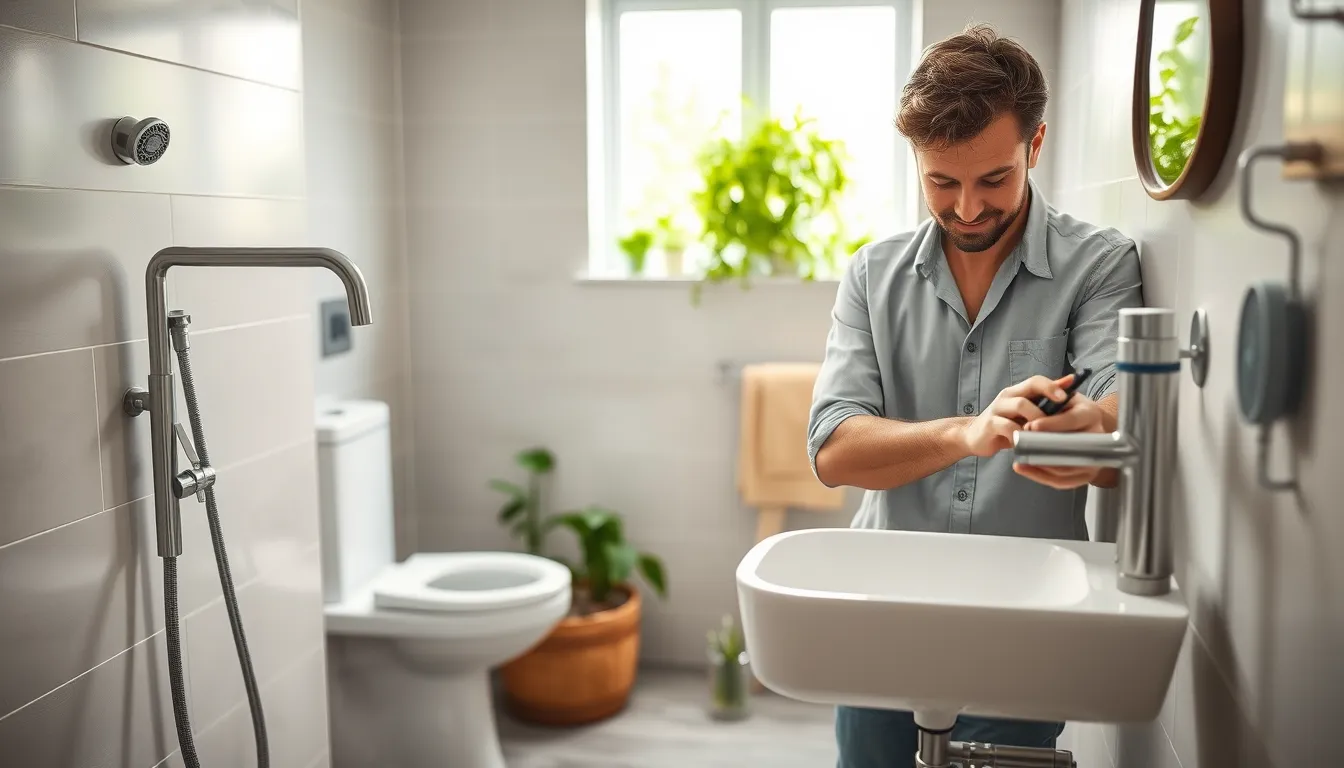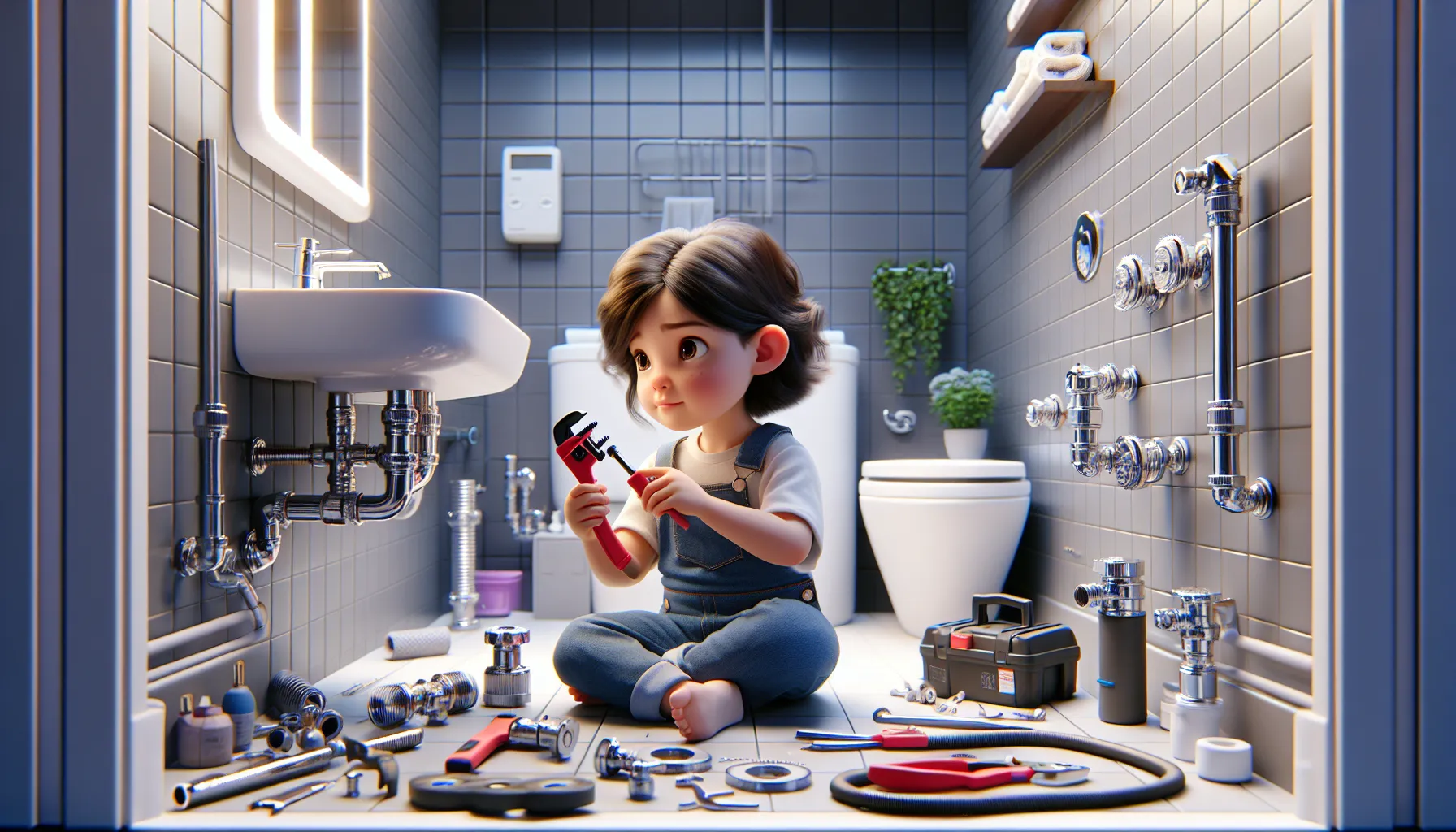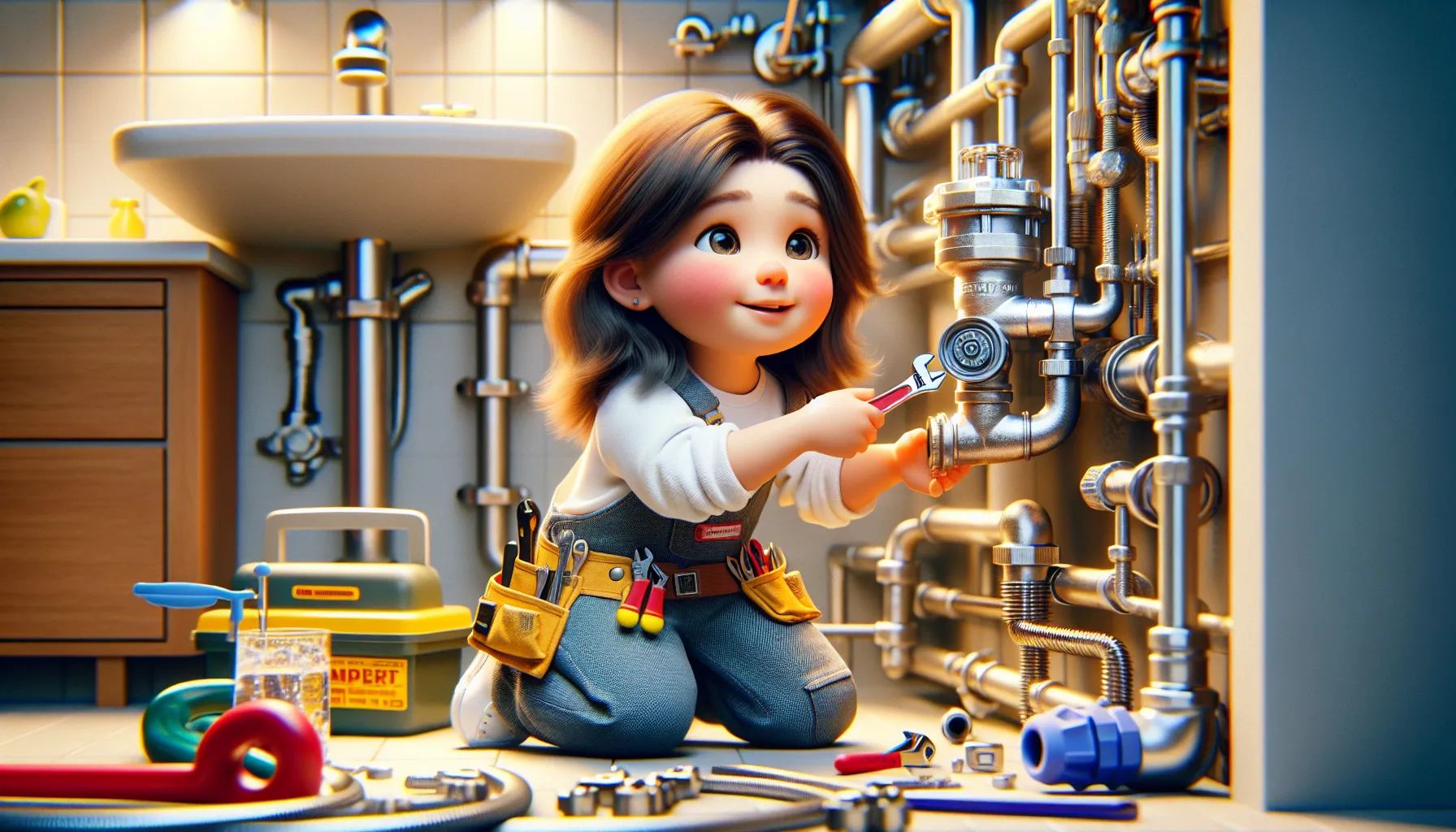In an era of increasing environmental awareness, eco-friendly plumbing has become more than just a trend—it’s a necessity. As we face global water scarcity and rising energy costs, implementing sustainable plumbing practices in our homes and businesses is crucial. This comprehensive guide will explore various eco-friendly plumbing tips that not only help conserve our precious water resources but also reduce energy consumption and lower utility bills.
Water Conservation Techniques
Low-Flow Fixtures
One of the simplest yet most effective eco-friendly plumbing tips is to install low-flow fixtures. These devices significantly reduce water usage without compromising functionality.
- Low-flow showerheads: Can save up to 2.5 gallons per minute
- Water-efficient faucets: Reduce water flow by 30% or more
- Low-flow toilets: Use 1.28 gallons per flush or less, compared to older models that use 3-7 gallons
Installing these fixtures is a straightforward process that can lead to substantial water savings over time.
Dual-Flush Toilets
Dual-flush toilets represent a significant advancement in water-saving technology. They offer two flushing options:
- A light flush for liquid waste (usually around 0.8 gallons)
- A full flush for solid waste (typically 1.6 gallons)
This system allows users to choose the appropriate flush volume, potentially saving thousands of gallons of water annually per household.
Touchless Faucets
Touchless faucets are not just for public restrooms anymore. These water-efficient fixtures offer several benefits:
- Prevent water waste by automatically shutting off when not in use
- Reduce the spread of germs by eliminating the need to touch handles
- Can be adjusted for optimal water flow and temperature
While initially more expensive, touchless faucets can lead to significant water savings in the long run.
Rainwater Harvesting
Rainwater harvesting is an ancient practice that’s gaining renewed interest as an eco-friendly plumbing solution. This system collects and stores rainwater for later use, such as:
- Watering gardens and lawns
- Flushing toilets
- Washing cars or outdoor areas
Implementing a rainwater harvesting system can dramatically reduce reliance on municipal water supplies, especially during dry seasons.
Energy-Efficient Water Heating
Tankless Water Heaters
Tankless water heaters, also known as on-demand water heaters, are a revolutionary eco-friendly plumbing solution. Unlike traditional water heaters that constantly heat and reheat water in a storage tank, tankless models heat water only when needed. Benefits include:
- Energy savings of up to 34% compared to conventional models
- Endless supply of hot water
- Longer lifespan (20+ years) compared to traditional water heaters (10-15 years)
- Space-saving design
While the initial cost is higher, the long-term energy savings and reduced environmental impact make tankless water heaters an excellent eco-friendly plumbing choice.
Solar Water Heating Systems
Solar water heating systems represent the pinnacle of eco-friendly water heating. These systems use the sun’s energy to heat water, offering:
- Significant reduction in energy bills (up to 80% in some cases)
- Decreased reliance on fossil fuels
- Low maintenance costs after initial installation
While the upfront cost can be substantial, many regions offer incentives for installing solar water heaters, making them more accessible to homeowners.
Energy-Efficient Traditional Water Heaters
If replacing your entire water heating system isn’t feasible, there are still ways to make traditional water heaters more eco-friendly:
- Insulate your water heater tank to reduce heat loss
- Lower the thermostat to 120°F (49°C) to save energy
- Regularly flush the tank to remove sediment and improve efficiency
These simple steps can significantly reduce energy consumption and extend the life of your water heater.
Sustainable Pipe Materials
Copper Pipes
Copper pipes have long been a staple in plumbing due to their durability and natural antimicrobial properties. From an eco-friendly perspective, copper offers several advantages:
- 100% recyclable
- Long lifespan (50+ years)
- Resistant to corrosion
While copper mining has environmental impacts, the material’s longevity and recyclability make it a sustainable choice for many plumbing applications.
PEX Pipes
PEX (cross-linked polyethylene) pipes are gaining popularity as an eco-friendly plumbing alternative. Benefits include:
- Flexibility, reducing the need for joints and fittings
- Resistance to scale and chlorine
- Lower heat loss compared to metal pipes
- Potentially lower environmental impact in production compared to metal pipes
PEX’s durability and efficiency make it an excellent choice for eco-conscious homeowners.
Recycled and Eco-Friendly Materials
The plumbing industry is increasingly exploring recycled and eco-friendly materials:
- Recycled steel and iron for pipes and fittings
- Bio-based plastics for certain plumbing components
- Reclaimed wood for decorative plumbing fixtures
While not all of these materials are suitable for every application, their development represents a positive trend towards more sustainable plumbing practices.
Water Recycling Systems
Greywater Recycling
Greywater recycling is an innovative eco-friendly plumbing practice that reuses water from sinks, showers, and washing machines for non-potable purposes. Benefits include:
- Reduced water consumption by up to 50%
- Decreased strain on septic systems
- Potential for use in landscape irrigation
Implementing a greywater system requires careful planning and may be subject to local regulations, but it can significantly reduce a household’s water footprint.
Blackwater Recycling
Blackwater recycling takes water conservation a step further by treating and reusing water from toilets. While more complex than greywater systems, blackwater recycling offers:
- Maximum water reuse potential
- Reduced load on municipal water treatment facilities
- Possibility for energy generation through biogas production
Blackwater recycling systems are typically more suitable for larger buildings or communities due to their complexity and cost.
Eco-Friendly Drain Cleaning
Natural Cleaning Solutions
Harsh chemical drain cleaners can damage pipes and harm the environment. Eco-friendly drain cleaning alternatives include:
- Baking soda and vinegar mixture
- Enzymatic cleaners
- Boiling water flush
These methods are gentler on pipes and safer for the environment.
Mechanical Cleaning Methods
Physical drain cleaning methods are both effective and eco-friendly:
- Plungers for minor clogs
- Drain snakes or augers for more stubborn blockages
- Hydro-jetting for severe or recurring clogs
These methods avoid the use of harmful chemicals while effectively maintaining your plumbing system.
Leak Prevention and Detection
Regular Maintenance Tips
Preventing leaks is crucial for water conservation. Regular maintenance should include:
- Checking for visible leaks around fixtures and appliances
- Inspecting exposed pipes for signs of corrosion or damage
- Testing toilet flappers and fill valves for proper function
Addressing small issues promptly can prevent major water waste and damage.
Smart Leak Detection Systems
Smart water monitors represent the cutting edge of eco-friendly plumbing. These systems can:
- Detect even small leaks quickly
- Monitor water usage patterns
- Alert homeowners to unusual water activity
By catching leaks early, smart systems can save thousands of gallons of water and prevent costly water damage.
Eco-Friendly Landscaping for Water Conservation
Drought-Resistant Plants
Choosing the right plants can significantly reduce outdoor water use:
- Native species adapted to local climate conditions
- Succulents and other drought-tolerant plants
- Grasses that require less water and maintenance
A well-designed landscape can be both beautiful and water-efficient.
Efficient Irrigation Systems
Modern irrigation technology can dramatically reduce landscape water use:
- Drip irrigation systems for targeted watering
- Smart sprinkler controllers that adjust based on weather conditions
- Rainwater sensors to prevent unnecessary watering
These systems ensure plants receive only the water they need, eliminating waste.
Professional Eco-Friendly Plumbing Services
Choosing a Green Plumber
When professional help is needed, choosing a green plumber can ensure your plumbing remains eco-friendly:
- Look for certifications in green plumbing practices
- Ask about their experience with water-efficient technologies
- Inquire about their commitment to sustainable practices
Benefits of Professional Eco-Friendly Plumbing
Professional eco-friendly plumbing services offer several advantages:
- Expertise in the latest water-saving technologies
- Ability to optimize entire plumbing systems for efficiency
- Knowledge of local regulations and incentives for green plumbing
Investing in professional services can lead to greater long-term savings and environmental benefits.
FAQs
Q: What are the most effective eco-friendly plumbing tips?
A: Installing low-flow fixtures, fixing leaks promptly, and considering water recycling systems are among the most impactful eco-friendly plumbing practices.
Q: How can I make my existing plumbing more eco-friendly?
A: Start by fixing leaks, insulating pipes and water heaters, and gradually replacing old fixtures with water-efficient models.
Q: Are eco-friendly plumbing solutions expensive?
A: While some solutions have higher upfront costs, many eco-friendly plumbing practices can lead to significant long-term savings on water and energy bills.
Q: How much water can I save with eco-friendly plumbing?
A: Depending on the measures implemented, households can reduce water consumption by 20-50% or more.
Q: What are the long-term benefits of eco-friendly plumbing?
A: Eco-friendly plumbing can lead to lower utility bills, reduced environmental impact, and potentially increased property value.
Conclusion
Implementing eco-friendly plumbing tips is not just good for the environment—it’s also beneficial for your wallet and your home’s efficiency. From simple fixes like installing low-flow fixtures to more comprehensive solutions like greywater recycling systems, there are numerous ways to make your plumbing more sustainable.
We encourage you to start small and gradually incorporate more eco-friendly plumbing practices into your home or business. Every drop saved and every kilowatt conserved contributes to a more sustainable future. Share these tips with friends and family, and consider consulting with a green plumbing professional to explore more ways to optimize your plumbing system for maximum efficiency and minimal environmental impact.
Remember, sustainable plumbing is not just a trend—it’s a responsible choice that benefits us all. Start your journey towards more eco-friendly plumbing today!



